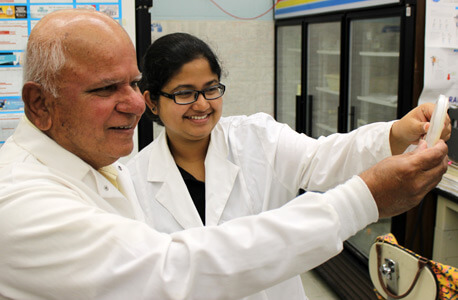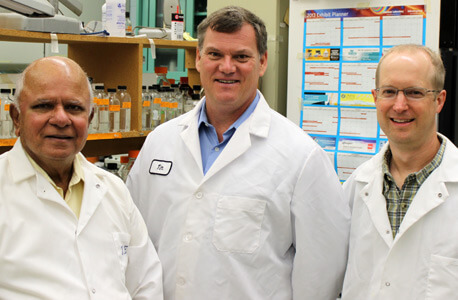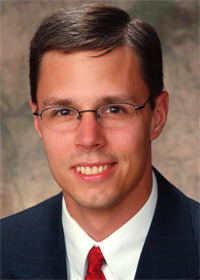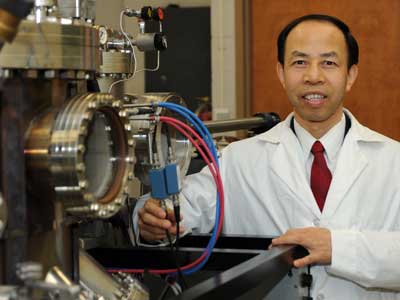First, the good news: Five NIU professors this summer snagged three prestigious grants that total nearly $1 million.
Now for the better news: the funding also provides cutting-edge research opportunities for NIU students, allowing them to work alongside top scientists in their disciplines.
“These are impressive research projects by an extraordinary group of faculty scientists here at NIU,” says Lesley Rigg, vice president of the Division of Research and Innovation Partnerships. “Not only are they pushing the frontier of knowledge is their research areas, but they’re also taking students along for the ride, essentially training the next generation of scientists.”
Chemistry professor Timothy Hagen is lead investigator on a project that will potentially involve dozens of student researchers. Hagen and NIU colleagues Rangaswamy “Nathan” Meganathan in biology and James Horn in chemistry won an Academic Research Enhancement Award of $356,000 over three years from the National Institute of Allergy and Infectious Diseases (NIAID), part of the National Institutes of Health.
The funding will be used to design and test new chemical compounds that may lead to improved drugs and other treatments for infectious disease.
“New drugs are desperately needed to combat the development of multi-drug resistant bacteria and other infectious diseases, such as malaria,” Hagen says. “This research makes use of a unique enzyme pathway that is found only in certain types of infectious disease-causing agents, but not in human beings.”
Students will gain experience in such areas as medicinal chemistry, protein crystal structure analysis, drug design, enzymatic assays, biophysical characterization, analytical methods and antibacterial assays. Some will even get the opportunity to use the Advanced Photon Source at Argonne National Laboratory to obtain high resolution images of protein crystal structures.
Two Research Rookies worked on the project before it was even funded, Hagen says.
“Currently we have five graduate students involved in the project and about eight undergraduates,” he adds. “The undergraduates are generally on a semester-by-semester basis through a senior-level research course (Chemistry 498), so this project has the potential of impacting dozens of students over the next three years.”
The two other recent grants were awarded to NIU scientists by the National Science Foundation (NSF).
Mark Frank, a professor in the Department of Geology and Environmental Geosciences, will receive $271,000 over three years to conduct research on the processes responsible for the formation of copper-rich and gold-rich portions of the Earth.
Experiments will be conducted at NIU, with high tech instruments to be used to determine the concentrations of copper and gold in various fluids and minerals over a wide range of temperatures and pressures.
“The data obtained will increase our understanding on the transportation of copper and gold in hydrothermal fluids and the precipitation mechanism responsible for the formation of these ore deposits,” Frank says. “The results of this research can provide direct economic benefits by improving exploration models for copper and gold ore deposits.”
Funds from the project also will be used to support and train two graduate students and one undergraduate in economic geology, experimental geology thermodynamics and data interpretation.
“The students will be involved in all aspects of the project,” Frank says. “I have a graduate student doing some preliminary work and will have an undergraduate and Ph.D. candidate working with me in the fall. The students get hands-on training for both academic and industrial worlds.”
Zhili Xiao, a Board of Trustees professor of physics who also is serving as interim associate dean for research and graduate studies, has brought in more than $2 million in support of research projects at NIU. His latest $328,000 NSF grant will support his nanoscience research over the next three years.
The project aims to advance understanding of artificial ices – fabricated substances that have the arrangement of their components following the ‘ice rule’ for the hydrogen atoms in crystalline water ice. Scientists are interested in the properties of these artificial ices, including the potential for revealing the mechanism of high temperature superconductivity.
For decades, scientists have been on a quest to develop room-temperature superconductors, which could revolutionize the energy industry and lead to a wide array of applications, such as magnetically levitated superfast trains, powerful supercomputers and devices that now only exist in the imaginations of science fiction writers.
Xiao’s research will provide a foundation for understanding and manipulating the new complex and collective effects that are expected in artificial ices. The NSF grant also will provide funding for training of two Ph.D. students.
“One of them has worked for me in the field of nanoscience for about two years and the second one joined my group this past spring,” Xiao says. “Both are certified users of Argonne’s Center for Nanoscale Materials.”
The students receive training on advanced nanofabrication tools, such as focused-ion-beam milling and electron-beam lithography. They fabricate superconductors with controlled shapes and dimensions and investigate their properties. The students also are trained in low-temperature physics and technologies and have the opportunities to participate in frontier research in materials sciences.




